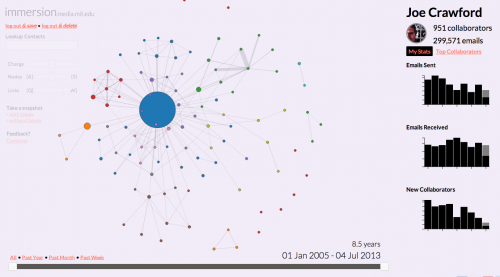If you have any interest in what metadata means, please give a read to Ethan Zuckerman’s piece Me and my metadata – thoughts on online surveillance. It gives context to what it means when security agencies are collecting metadata. Everywhere we go in this modern age, we’re leaving digital trails. Off the top of my head, the trails I leave are:
- Cell phone usage (calls, texts, data usage), stored by my phone carrier
- Debit cart usage, stored by my bank
- Security camera footage, stored by various municipalities and businesses
- Library card usage, stored by my Library
- Loyalty card usage for various grocery stores
- Foursquare checkins
- Google Latitude usage
- Apple: Find my iPhone service
- Usage of digital services via my phone, many authenticate and store usage. Twitter, Facebook, Google, and many, many others
What does it mean? What are my rights? Do I have any? As a longtime blogger, and “moblogger” as we used to call it in the form of Foursquare and Twitter, I essentially have lived out in the open 15 years. I went on the radio in 2002 to talk about “blogging” and talked about some of this then. I have had the same public phone number available on my website for about 10 years.
I’m amazed at what mining my email for a few minutes can produce in terms of the relationships I have. Immersion did this in like 4 minutes. This is just my email metadata.
I imagine that given a large corpus of metadata, from many disparate persons, a great deal more could be visualized. What might be shown.
Then the larger question is – who cares? Who would go to the trouble to look at these graphs to try and learn something about me?
There’s a wonderful piece from last month called Using Metadata to Find Paul Revere. It imagines a British Intelligence service to examine the clubs of the Pre-Revolutionary era and finding Paul Revere significant — because of metadata analysis. Particularly relevant here on July 4th.
It’s a strange time. All this is changing how we see each other, and government, and business.
We must sort out what rights and responsibilities we have now that we have these capabilities in our computers.

